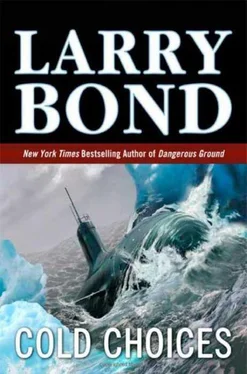“What are we going to do now, Captain?”
“I wish to God I knew, Vasiliy. We’ve done everything we possibly can.”
“There’s still that option the doctor and I talked about,” suggested the starpom.
“What? Oh yes, I suppose we should give it more consideration. It may buy us a little more time,” Petrov replied. “I guess we should go find the good doctor.”
At that moment, Balanov entered the central post and walked up to them. He looked worn out, but his movements suggested he was agitated.
“Ah, Doctor, we were just about to come visit you,” said Kalinin jovially.
“Captain, Starpom,” Balanov greeted them formally. “Captain, I wish to report that there are complications developing with some of the injured.”
“Complications?” Petrov echoed with a mixture of confusion and worry. “What sort of complications?”
“Sir, a number of the injured have started showing symptoms of mild hypothermia. I’ve taken the temperature of several of them, and their core temperatures are at or just below thirty-five degrees Celsius. There are some indications that several of the other crew members are starting to show symptoms as well.”
“Doctor, we’ve given you as many survival suits as you require and most of the bedding,” exclaimed Kalinin defensively.
“Starpom, you don’t understand! The suits and blankets only slow the rate at which heat is lost! It’s taken several days, but with such low ambient temperatures, hypothermia is inevitable.”
“All right, Doctor, what are the short-term implications?” Petrov asked. He was well aware that death was the ultimate result.
“At this stage, the patient will start to shiver uncontrollably It’s the body’s attempt to generate heat through muscle activity. This means that his blood pressure, heart rate, and breathing rate all increase. If enough members of the crew start suffering from hypothermia, our carbon dioxide problem will get considerably worse.”
Pained expressions showed on both their faces, as the impact of the doctor’s explanation struck them. Ravaged by the seemingly never-ending string of bad news, Petrov fell against the bulkhead for support and rubbed his face with both hands.
“Captain, we must find a way to generate some heat before things get worse,” implored Balanov.
“And just how do you suggest I do that!?!” snapped Petrov angrily. Immediately, he regretted lashing out at the doctor. He wasn’t the cause of this latest problem; he was just the messenger.
Sighing, Petrov reached out and placed his hand on the doctor’s shoulder. “I’m sorry, Viktor, you are merely doing your duty. Thank you, for your report. I will… I will try and think of something. In the meantime, I want you to prepare to issue sleeping drugs to as many of the crew as you can. I know, I know it buys us only a little time. But right now I’ll take every minute I can get.”
Balanov nodded and wearily withdrew.
“Now what?” asked Kalinin bluntly, as he watched Petrov push himself upright.
“I think it’s time I have a chat with Vidchenko and inform him of this new problem, then find out what they are going to do next.”
USS Seawolf
Seawolf and Churchill were running parallel racetracks, long, slow patterns designed to let ships move without actually going anywhere. At five knots, it took over an hour and a half for them to cover one side of the eight-mile leg. They’d turn a full 180 degrees, then countermarch back along the same line.
The two ships were separated by three miles, more than enough distance between a surface ship and a submerged submarine. With two of her transmitters and one multimission mast repaired, Seawolf could now transmit and receive from periscope depth, letting her stay in her natural, and preferred, environment.
With both ships at creep speed, it also maximized their passive sonar detection. Even though they were about fifty miles away, Seawolf heard the rather noisy AS-34 on herTB-29 towed array, both ships heard the charges detonate. Then nothing.
Jerry had wanted the Russian plan to work. He’d prayed and waited, knowing that the Russians weren’t stupid. The minisub had made two earlier dives. They could see what needed to be done. They’d overengineered the job with charges that might actually cause more damage to the sub, but were surely big enough to clear whatever was holding Severodvinsk in that port list.
Seawolf and Patty had bought Severodvinsk some time. He was proud of that unorthodox resupply effort, but now it looked like it wouldn’t be enough. The Russians had wasted that chance, missed their best, and perhaps only, shot. They could have planted charges on their first dive, and done a better job of it, if they had used the information Rudel had tried to give them.
Jerry felt somehow responsible for the Russians’ mistrust. He knew it was stupid to think so, and ran though every action, every decision he’d made since the collision, and then since they’d entered the Barents. He could think of nothing that would have affected the Russians’ refusal, but the feeling wouldn’t go away. His stomach knotted, and with Seawolf riding smooth at two hundred feet, he knew it wasn’t seasickness.
Were Petrov and his men doomed? After hearing the Russian’s voice over the underwater telephone, Jerry thought of him as a person. He could imagine the man, like any good captain, doing his best to take care of his crew until help arrived. It was easy to imagine himself on that boat, in Petrov’s place, or more properly as one of his officers. Rudel could imagine himself in Petrov’s position. And he probably did, in his nightmares.
Jerry was touring the boat before visiting control. He didn’t need to, but it was constructive, and he didn’t have the heart for paperwork right now.
As he passed the crew’s mess, the Wolf’s Den, he saw a new email had been posted. It had been sent by Britt Adams, a reporter on Churchill but the original sender had been a Russian woman, Olga Sadilenko. She had sent questions to Adams, who passed them to Rudel. Rudel apparently answered them and then responded back through Adams. It probably violated several regulations, but Joanna Patterson knew about it and approved. That was enough for Jerry, and also Rudel. The woman deserved answers.
Dear Captain Rudel,
Thank you for the answers Mr. Adams has sent us. Although I thank him as well, I know that they came from you. It must have been hard to give us such bad news, but we have been waiting for any word for a very long time. Knowing who has died and who is hurt is very hard, but the knowing is better. My Yakov is hurt and still in danger, but he has his shipmates and captain to take care of him, and that is a comfort.
All of us are grateful for everything you have done to help our men. Our Navy said that the collision was your fault, but you should know that we do not always believe what our Navy says. Since the collision, you have saved their lives once, maybe twice. You and your men will be in our prayers, along with ours.
Jerry read it twice. He wondered how many times Rudel had read it.
10 October 2008
1855/6:55 PM
Severomorsk
The Seaman’s Memorial Church had never closed its doors, even at the height of Communist power. Built when the town was still called Vayenga, it had seen many tragedies. Whatever its name, Severomorsk had always been a port, and sailors didn’t always return.
Right now the church was filled with the families and friends of the men of Severodvinsk. The mayor and most of the city government had come. It was both a memorial for those known to have died, and a prayer service for those injured and still in peril. With definite news, the wives and mothers had decided not to wait for the crew’s rescue.
Читать дальше












